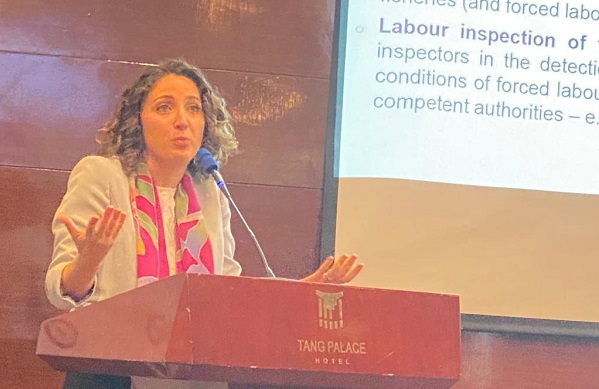
More fishers trapped in forced labour - ILO
A total of 128,000 fishers globally are trapped in forced labour aboard fishing vessels, the International Labour Organisation (ILO) has disclosed.
These trapped fishers in forced labour are mostly used in excessive overtime and also receive very low or no wages at all.
Advertisement
The ILO has, therefore, urged member states of the Fisheries Committee for the West Central Gulf of Guinea (FCWC) to ratify the ILO convention 188 to help promote decent work in the fisheries sector in the FCWC region and also prevent forced labour in the area.
Speaking at the day two of the ongoing 14th session of the FCWC’s conference of fisheries ministers, experts and development partners in Accra on Thursday, January 12, 2023, the Global Coordinator of ILO’s 8.7 Accelerator Lab, Ms. Alix Nasri, said many of the labour infractions on the fishing vessels occur due to weak monitoring of labour conditions.
She was of the view that ratifying the ILO Convention 188 would help to prevent many of the labour infractions that occur on fishing vessels in the FCWC region.
Ms. Nasri expressed the concern that labour infractions, particularly concerning fishers aboard fishing vessels was growing and needed to be stemmed.
ILO Convention 188
The ILO’s work in Fishing Convention (ILO 188) came into force internationally on November 16, 2017.
ILO 188 applies to all fishermen working on fishing vessels of any size, with more prescriptive standards for vessels over 24m in length or operating on longer voyages, three days or more.
ILO 188 entitles all fishermen to written terms and conditions of employment (a Fisherman’s Work Agreement), decent accommodation and food, medical care, regulated working time, repatriation, social protection and health and safety on board.
It also provides minimum standards relating to recruitment and placement and includes a mandatory requirement to have a certificate of medical fitness to work onboard a fishing vessel.
FCWC
The FCWC was established in 2007 to promote and facilitate cooperation in fisheries management between the FCWC’s member countries—Ghana, Togo, Nigeria, Liberia, Benin, and Cote d'Ivoire.
These six FCWC countries have several shared fish stocks and identified the need for cooperation and shared management of these resources.
For his part, the Secretary-General of the FCWC, Mr Seraphin Dedi, said many of the labour infractions aboard fishing vessels could be prevented when Illegal, Unreported and Unregulated (IUU) fishing was stopped.
He was of the view that many of the labour infractions mostly happened on fishing vessels that are engaged in IUU fishing.
He said the FCWC was working with ILO to help address labour issues on fishing vessels in its member states.
As part of addressing labour issues in the fisheries sector in the FCWC countries, Mr Dedi, said some journalists in the FCWC countries had been trained on ILO Convention 188 to enable them to report accurately on the subject.
For him, arming journalists with the needed tools would help them to bring to light some some of the major issues that needed to be addressed in the fisheries sector, particularly regarding labour issues.
The FCWC conference
The 14th session of the Conference of the Ministers of the Fisheries Committee for the West Central Gulf of Guinea, which is being done in-person and online, is on the theme: “Supporting effective fisheries management for a sustainable blue economy.”
The conference is being attended by the fisheries ministers of the six FCWC member states or their representatives, as well as representatives of development partners of FCWC, including ECOWAS, Food and Agriculture Organisation (FAO), African Union, and Japan International Cooperation Agency (JICA).
The session’s participants would deliberate on the theme, review the past year’s results, and agree on a work plan and budget for the 2023/2024 period to be submitted to the Ministers to adopt.



